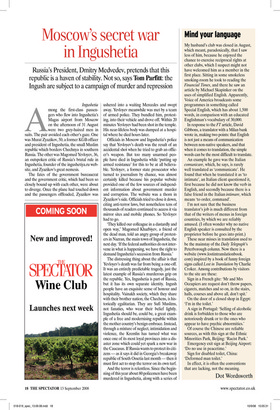Mind your language
My husband’s club was closed in August, which meant, paradoxically, that I saw less of him, because he enjoyed the chance to exercise reciprocal rights at other clubs, which I suspect might not have welcomed him as a member in the first place. Sitting in some smokeless smoking-room he took to reading the Financial Times, and there he saw an article by Michael Skapinker on the uses of simplified English. Apparently, Voice of America broadcasts some programmes in something called Special English, which has about 1,500 words, in comparison with an educated Englishman’s vocabulary of 30,000.
In response to the FT article, David Gibbons, a translator with a Milan bank wrote in, making two points: that English is not just a means of communication between non-native speakers, and that when it comes to translation, the simple words can be the most difficult to translate.
An example he gave was the Italian comunicare, which, he says, is rarely well translated as ‘communicate’. He found that when he translated it as ‘to intimate’, an Italian client questioned it, first because he did not know the verb in English, and secondly because there is a false friend in the Italian intimare, which means ‘to order, command’.
I’m not sure that the business translator’s job is much different from that of the writers of menus in foreign countries, by which we are reliably amused. (I often wonder why no native English speaker is consulted by the proprietor before he goes into print.) These near misses in translation used to be the mainstay of the Daily Telegraph’s Peterborough column. Now there is a website (www.lostintranslationbook. com) inspired by a book of funny foreign signs called Lost in Translation by Charlie Croker. Among contributions by visitors to the site are these: Sign in a French gite: ‘Mr and Mrs Occupiers are request don’t throw papers, cigarets, matches and so on, in the stairs, halls, courses and above all, don’t spit.’ On the door of a closed shop in Egypt: ‘I’m in the toilet.’ A sign in Portugal: ‘Selling of alcoholic drink is forbidden to those who are notoriously drunk or to the ones who appear to have psychic abnormities.’ Of course the Chinese are reliable sources, as with this sign at the Ethnic Minorities Park, Beijing: ‘Racist Park.’ Emergency exit sign at Beijing Airport: ‘Do no use in peacetime.’ Sign for disabled toilet, China: ‘Deformed man toilet.’ In effect, it is often the conventions that are lacking, not the meaning.
Dot Wordsworth










































































 Previous page
Previous page